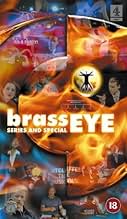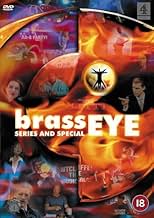Controversial spoof of current affairs television, and the role of celebrity in the UK.Controversial spoof of current affairs television, and the role of celebrity in the UK.Controversial spoof of current affairs television, and the role of celebrity in the UK.
- Nominated for 2 BAFTA Awards
- 3 nominations total
Browse episodes
Summary
Reviewers say 'Brass Eye' is a groundbreaking media satire that critiques sensationalism and media intelligence. It is noted for its uncomfortable, angry tone and clever use of graphics and music. The series lampoons trash media sensationalism on various subjects, trapping celebrities and politicians. It is considered a powerful assault on 90's media, remaining relevant and often compared to 'The Day Today'. Its subversive nature, controversial content, and ability to provoke thought make it a must-watch for fans of dark, satirical humor.
Featured reviews
Any show which brasses off the editor of 'The News Of The World' is OK by me. The furore that surrounded the notorious 'paedophilia' special has ensured that 'Brass Eye' will not easily be forgotten. What was amusing was the way Rebekah Wade missed the point; it was not 'sending up' paedophilia', you can't do that, but rather the lynch-mob mentality of publicity-seeking tabloid rags. The rest of 'Brass Eye' was great too; particularly 'Drugs'. When Noel Edmonds uttered the phrase 'Shatner's Bassoom', I nearly died laughing. Top marks to Chris Morris for managing to trap so many D-list celebrities and charlatan politicians into making utter fools of themselves. As with 'The Day Today', the use of graphics and music is both clever and imaginative; an image of Peter Stringfellow was mocked in the 'Sex' episode. If 'Brass Eye' still shocks nearly a decade later, it is a testament to the genius of its creator. And it proved that the success of 'The Day Today' was not all down to Steve Coogan.
Brass Eye is a quite awesome achievement. As I write this review, most of Britain's press is up in arms over the recent one-off episode which satirised the particularly sensitive subject of paedophilia. The majority of people claim that it is simply sick to even attempt to make a comedy based on such a theme. However, while not for the easily offended, Chris Morris' style has always been to approach serious issues using interesting methods. This particular episode managed to make some very interesting points, often highlighting the gross inconsistencies in the way in which crime and taboo subjects are dealt with.
A great deal of the humour comes from Morris managing to get celebrities to say the stupidest things. The fact that they are so easily convinced to speak such nonsense, highlights the ignorance and paranoia surrounding the whole subject. Amongst other things, we are told that paedophiles can feel children's faces via computer screens, that they occupy an area of internet the size of Ireland, that they can make toxic fumes rise from keyboards to make children more suggestible, that, genetically, they have more in common with crabs than people. At one stage, Kate Thornton tells us with utter seriousness that HOECS games are used by paedophiles to interact with children. It is quite incredible to see these people saying such things with such belief.
Other highlights include the Eminem spoof, JL B8; a story about a cheeky cockney ex-paedophile who does bus tours of his 'old haunts' - a brilliant spoof of the way the press treats the old east-end London gangsters these days; and an on-going news report showing a crowd lynching a paedophile when released from prison and burning him in a wicker phallus: scarily reminiscent of the mobs that ran wild in Britain in summer 2000.
To dismiss this or any other episode in the '97 series as sick and utterly unamusing, is to display an ignorance or unwillingness to address the very serious issues being dealt with. Just because there is humour involved, does not mean the issues are being sanitised - it actually makes them more poignant.
A great deal of the humour comes from Morris managing to get celebrities to say the stupidest things. The fact that they are so easily convinced to speak such nonsense, highlights the ignorance and paranoia surrounding the whole subject. Amongst other things, we are told that paedophiles can feel children's faces via computer screens, that they occupy an area of internet the size of Ireland, that they can make toxic fumes rise from keyboards to make children more suggestible, that, genetically, they have more in common with crabs than people. At one stage, Kate Thornton tells us with utter seriousness that HOECS games are used by paedophiles to interact with children. It is quite incredible to see these people saying such things with such belief.
Other highlights include the Eminem spoof, JL B8; a story about a cheeky cockney ex-paedophile who does bus tours of his 'old haunts' - a brilliant spoof of the way the press treats the old east-end London gangsters these days; and an on-going news report showing a crowd lynching a paedophile when released from prison and burning him in a wicker phallus: scarily reminiscent of the mobs that ran wild in Britain in summer 2000.
To dismiss this or any other episode in the '97 series as sick and utterly unamusing, is to display an ignorance or unwillingness to address the very serious issues being dealt with. Just because there is humour involved, does not mean the issues are being sanitised - it actually makes them more poignant.
Chris Morris' brilliant 'Brass Eye', a satire on tabloid television, the ascendancy of the celebrity class and, more generally, the culture of stupidity, is arguably the most subversive television comedy ever made, and one the funniest. In an age where programs abound in which the rich and famous are invited to gently send themselves up, on the grounds that all publicity is good, Morris triumphantly shatters the myth, as a rich stream of unwitting victims emerge exposed as the idiots they are. Some tried to get the program banned, but undeterred, Morris retorted by making a special episode on the taboo issue of paedophilia. The wholly staged segments are good as well, and though 'Brass Eye' occasionally makes for uncomfortable viewing, this is to the credit of a program designed to force one to think about one's beliefs. Personal favourite scenes include MP Rhodes Boyson gormlessly endorsing the deployment of Batman as a way of fighting crime, and the jam-making company which encourages the use of illegal drugs to enhance performance. A program to watch and enjoy, but also to remember the next time you're asked to take something for granted.
In these brightly Orwellian days, where cynical governments can smile 'Trust me...' and know we will fill in the blanks 'I'm lying' and not care; where 'biting' satire is left in the sole hands of a cricket-loving impressionist; where the laurel of 'great comedy' is placed on the head of yet another formulaic spoof of fly-in-the-wall documentaries; in these grimly shining times, Chris Morris is a dark beacon of sense, moral fury, fierce intelligence, intransigent vision; a man of endless, astonishing invention, intimidating energy and a gleefully, pranksterish sensibility.
The problem with today's 'satire' is that it sets up an 'us against them' opposition, in which we snicker with the satirist at a host of immovable, indifferent caricatures. Most of our most prominent satirists are of the same generation, background and ideology of the ruling classes, and their humour has the flavour of locker-room ribbing rather than devastating anger. Most satire consists of an audience talking to itself, reassuring itself of its own worth, its own values against targets so clearly ridiculous they don't really exist. It is satire as easy listening, as reassuring as old socks.
The reason many people don't like Chris Morris is not because of the 'taboo' subject matter he tackles, but because he doesn't play fair, he doesn't play cricket. He never allows the audience the comfort of complacent complicity. if we sneer at another hapless celebrity duped into piously anguishing over some preposterous non-issue in an obscene public gesture of their own ethical value and depth, we are stating that we are truly 'authentic', that we would never be caught out, that our values are sound. And then Morris will insert a crass joke that strips away the warm cloak of lazy irony - an imitation of the author of 'A Brief History of Time', for instance - that repels us, shakes us out of a cosy 'us vs them' mentality, forcing us to face up to the complexity of what we're watching, or - shock, horror! - think for ourselves.
When I was watching the 'Brass eye' repeats recently, I was struck by how little they had dated, how exhilirating and intellectually stimulating, as well as cripplingly funny, they still were. Surely a media satire, with its inbuilt topicality, should become instantly anachronistic. You could argue that this is a damning indictment of a media that hasn't changed its mind-numbing habits in the last half-decade. I would argue, however, that 'Brass eye' is not really a media satire at all, or is not one fundamentally, despite its destructively accurate potshots at sensationalism, the paucity of media intelligence, a culture with a media that no longer records or reflects reality, but actually creates it, as in the recent case of a major Sunday newspaper printing photos of paedophiles, encouraging the public to savage them, conveniently creating the next morning's news. This is all an essential part of what 'Brass eye' does.
But it is more than that. Morris is our century's Jonathan Swift, and last week's 'Brass eye special' on media hysteria about paedophilia was his 'A Modest Proposal', a satire so savage, so angry, so uncomfortable, so ironic in the true, original sense of that phrase, that people mistook the satire for its object, because Morris held up a mirror to our society, a totalitarian, propaganda-corrupt culture posing as a democracy; and to ourselves, we who conceal brutal, fascist instincts under a guise of ethical concern. We didn't like it, and rather than acknowledge our own darkness, we tried to smash the mirror. Like Swift, Morris has always been more concerned with language and ontology than the media per se, the way words no longer mean what they are supposed to mean, in the way the advance of media technology has created an illusionistic world in which 'real' people have to live, in which we try to make the illusion real, to devastating results. And yet, again like Irishman, the sheer invention with which Morris records this communicative decadence channelled through language, liberates and gives some hope - but only if we accept the challenge of 'Brass eye'.
The problem with today's 'satire' is that it sets up an 'us against them' opposition, in which we snicker with the satirist at a host of immovable, indifferent caricatures. Most of our most prominent satirists are of the same generation, background and ideology of the ruling classes, and their humour has the flavour of locker-room ribbing rather than devastating anger. Most satire consists of an audience talking to itself, reassuring itself of its own worth, its own values against targets so clearly ridiculous they don't really exist. It is satire as easy listening, as reassuring as old socks.
The reason many people don't like Chris Morris is not because of the 'taboo' subject matter he tackles, but because he doesn't play fair, he doesn't play cricket. He never allows the audience the comfort of complacent complicity. if we sneer at another hapless celebrity duped into piously anguishing over some preposterous non-issue in an obscene public gesture of their own ethical value and depth, we are stating that we are truly 'authentic', that we would never be caught out, that our values are sound. And then Morris will insert a crass joke that strips away the warm cloak of lazy irony - an imitation of the author of 'A Brief History of Time', for instance - that repels us, shakes us out of a cosy 'us vs them' mentality, forcing us to face up to the complexity of what we're watching, or - shock, horror! - think for ourselves.
When I was watching the 'Brass eye' repeats recently, I was struck by how little they had dated, how exhilirating and intellectually stimulating, as well as cripplingly funny, they still were. Surely a media satire, with its inbuilt topicality, should become instantly anachronistic. You could argue that this is a damning indictment of a media that hasn't changed its mind-numbing habits in the last half-decade. I would argue, however, that 'Brass eye' is not really a media satire at all, or is not one fundamentally, despite its destructively accurate potshots at sensationalism, the paucity of media intelligence, a culture with a media that no longer records or reflects reality, but actually creates it, as in the recent case of a major Sunday newspaper printing photos of paedophiles, encouraging the public to savage them, conveniently creating the next morning's news. This is all an essential part of what 'Brass eye' does.
But it is more than that. Morris is our century's Jonathan Swift, and last week's 'Brass eye special' on media hysteria about paedophilia was his 'A Modest Proposal', a satire so savage, so angry, so uncomfortable, so ironic in the true, original sense of that phrase, that people mistook the satire for its object, because Morris held up a mirror to our society, a totalitarian, propaganda-corrupt culture posing as a democracy; and to ourselves, we who conceal brutal, fascist instincts under a guise of ethical concern. We didn't like it, and rather than acknowledge our own darkness, we tried to smash the mirror. Like Swift, Morris has always been more concerned with language and ontology than the media per se, the way words no longer mean what they are supposed to mean, in the way the advance of media technology has created an illusionistic world in which 'real' people have to live, in which we try to make the illusion real, to devastating results. And yet, again like Irishman, the sheer invention with which Morris records this communicative decadence channelled through language, liberates and gives some hope - but only if we accept the challenge of 'Brass eye'.
With such modern stuff as Phoenix nights and The Office this is often overlooked nowadays but there's no doubting the power this had when made. Its a lot more controversial, perhaps the most controversial piece of satire seen on British television. Especially the Paedogedden episode which is on the DVD along with the original series. It caused a media uproar when the point was missed entirely, specifically the medias obsession with the topic of paedophilia and a victim obsessed society, True though it isn't the funniest, i would give that to the Drugs and animals episodes though all have a very strong angry message, People like Chris Morris are vital and he deserves praise for the vision and the bravery to make the show. (The celebrities tricked into appearing on the show are also a highlight throughout) The over the top graphics and deadpan style of it also adds to the show greatly.
Absolutely recommended though not for the easily offended or shallow minded.
Absolutely recommended though not for the easily offended or shallow minded.
Did you know
- TriviaThe Paedogeddon Special is the third most complained-about episode of television ever (first and second are the Jerry Springer Opera and Big Brother 2000).
- Quotes
Christopher Morris: You're wrong, and you're a grotesquely ugly freak!
- Alternate versionsWhen the show first aired in 1997, some of the more controversial sketches were cut on the orders of the then-head of Channel 4 programming Michael Grade, most notably a piece concerning a musical based on the life of and starring the serial killer Peter Sutcliffe. The edition of the show in which the sketch would have featured was allegedly broadcast containing a onscreen subliminal message lasting 1/25 of a second that read "Grade is a cunt". The series was repeated in 2001 with the Sutcliffe sketch and some other material shown uncut, and with the subliminal message removed.
- ConnectionsFeatured in Storm Over 4 (1998)
- How many seasons does Brass Eye have?Powered by Alexa
Details
Contribute to this page
Suggest an edit or add missing content

































